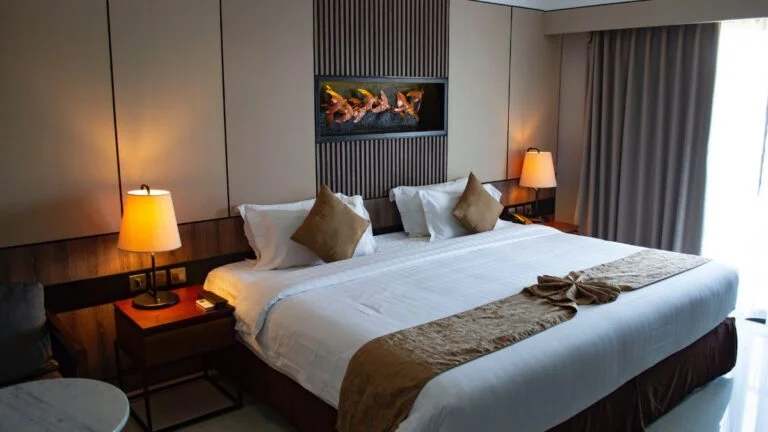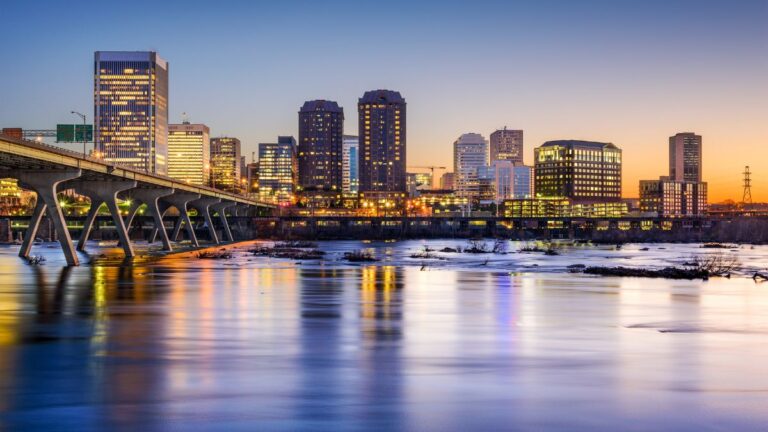Why Are Hotel Rooms More Expensive on Weekends? Understanding the Weekend Price Hike

As participants in Amazon Associates and other programs, we earn from qualifying purchases. This comes at no additional cost to you. For more details, see our Affiliate Disclosure.
Have you ever wondered why hotel rooms are more expensive on weekends? It’s a common question that many travelers have asked themselves. In this article, we will explore the reasons behind the weekend price hike and help you understand why hotel rates fluctuate.
One of the main reasons for the increase in hotel prices on weekends is due to supply and demand. During the weekend, more people are traveling for leisure and looking for a place to stay. This increased demand for hotel rooms often results in higher prices. Additionally, many hotels have special events or promotions on weekends that can also drive up the cost of a room.
Understanding the Weekend Price Hike
There are several reasons why hotel rooms are more expensive on weekends. One of the main factors is supply and demand. During the weekend, more people are traveling for leisure and looking for a place to stay. This increased demand for hotel rooms often results in higher prices.
Other factors that can affect hotel prices on weekends include location, seasonality, ratings, and amenities. For example, hotels in popular destinations or close to airports and landmarks may have higher rates due to their desirable location. Additionally, hotels may offer special events or promotions on weekends that can also drive up the cost of a room.
Supply and Demand: The Role of Travel Patterns
One of the primary reasons for the weekend price hike in hotel rooms is the fundamental economic principle of supply and demand. Travel patterns significantly impact the availability and cost of hotel accommodations. During the weekend, there is a noticeable shift in travel behavior, with more people opting for leisure trips, weekend getaways, or family vacations. This surge in demand for hotel rooms creates a disparity between supply and demand, allowing hotels to increase their prices.
The higher demand for weekend hotel stays can be attributed to several factors. Firstly, many individuals have more flexibility in their schedules on weekends, making it an ideal time for leisure travel. Families with children, in particular, often plan their vacations or short trips for the weekend when school or work commitments are less demanding. Additionally, weekend travel is appealing to individuals seeking a break from their routine or looking to explore new destinations without taking time off from work.
As the demand for hotel rooms increases during weekends, hotels experience higher occupancy rates. To maintain a balance between the available rooms and the number of travelers, hotels adjust their prices accordingly.
The increase in rates during weekends helps hoteliers optimize their revenue by capturing the willingness of travelers to pay more for accommodation when options may be limited.
Special Events and Promotions: How They Affect Hotel Prices
In addition to supply and demand, special events and promotions also play a significant role in influencing hotel prices on weekends. Hotels often leverage these events to attract more guests and maximize their revenue. Let’s take a closer look at how special events and promotions affect hotel prices.
Special events, such as conferences, weddings, concerts, sports tournaments, or festivals, can have a substantial impact on hotel pricing. These events draw a significant number of attendees who require accommodation. As a result, hotels in the vicinity of the event venue or those designated as official event accommodations tend to experience increased demand.
In anticipation of higher occupancy rates, hotels may adjust their prices, often raising them to capitalize on the limited availability of rooms. This price adjustment reflects the increased value and convenience offered by staying at a hotel close to the event.
Promotions are another factor that can influence hotel prices on weekends. Hotels may design special packages or discounts targeting weekend travelers. These promotions often include perks like complimentary breakfast, spa services, late check-out, or discounted rates for extended stays.
By offering these incentives, hotels aim to attract more guests and differentiate themselves from competitors. However, it’s important to note that while promotions can lead to lower prices for some guests, they may not always be applicable during peak travel periods or for all room types.
Both special events and promotions contribute to the fluctuation of hotel prices on weekends. The presence of events drives up demand, leading to price increases, while promotions can create opportunities for guests to find discounted rates or added value for their stay. It’s essential for travelers to stay informed about upcoming events and promotions to make informed decisions about their weekend hotel bookings and potentially take advantage of any available discounts or benefits.
Location Matters: The Impact of Destination Popularity
When it comes to hotel prices on weekends, the location of the hotel plays a crucial role. Popular destinations or areas with high tourist footfall tend to have higher hotel rates during weekends. Let’s delve into how the impact of destination popularity affects hotel prices.
In highly sought-after destinations, such as popular tourist spots, vibrant city centers, or coastal areas, the demand for accommodations naturally surges on weekends. Travelers often choose these locations for leisure activities, sightseeing, or relaxation, making them prime choices for weekend getaways. As the demand for hotel rooms increases, hotels in these areas have the advantage of offering convenient access to attractions, entertainment, and amenities, which adds value to their offerings.
The limited availability of hotel rooms in popular destinations during weekends leads to a competitive market, enabling hotels to charge higher rates. The principle of supply and demand comes into play here, with the limited supply of rooms and the high demand from travelers willing to pay a premium for a desirable location. Hotels in such areas often capitalize on their advantageous position by adjusting their rates to reflect the popularity of the destination.
Moreover, proximity to airports, landmarks, or major events can also affect hotel prices. Hotels located near airports tend to cater to business travelers or individuals looking for convenient overnight stays before or after their flights. These hotels may experience higher demand during weekends when leisure travelers take advantage of the days off to explore new destinations. The convenience of being close to transportation hubs or landmarks adds value to the hotel’s location, which can result in higher prices.
Tips for Saving Money on Weekend Hotel Stays
While weekend hotel prices may be higher due to increased demand, there are several strategies you can employ to save money on your weekend getaway. Consider the following tips:
- Plan and book in advance: By planning your weekend trip well in advance, you can take advantage of early booking discounts and secure lower rates. As hotel availability decreases closer to the date, prices tend to rise. Booking early allows you to secure a better deal.
- Be flexible with your travel dates: If possible, consider adjusting your travel dates to include weekdays. Many hotels offer discounted rates during weekdays when business travelers are less active. By extending your stay to include a Sunday or Monday night, for example, you may find more affordable rates.
- Utilize loyalty programs and memberships: Joining hotel loyalty programs or memberships can offer benefits such as discounted rates, exclusive promotions, and additional perks like free breakfast or room upgrades. Take advantage of these programs to save money and enjoy additional amenities during your stay.
- Compare prices and look for deals: Utilize online travel agencies, hotel comparison websites, and hotel booking apps to compare prices across different platforms. Look for special deals, flash sales, or last-minute discounts that can help you secure a better rate for your weekend stay.
- Consider alternative accommodations: Explore options beyond traditional hotels. Vacation rentals, bed and breakfasts, hostels, or even home-sharing platforms can offer more affordable alternatives, especially if you’re traveling with a group or seeking a unique experience.
- Stay outside city centers: Hotels located in city centers or popular tourist areas tend to have higher rates. Consider staying in nearby suburbs or areas outside the main tourist hubs to find more affordable accommodations. This may require a bit of extra travel, but it can significantly impact your overall budget.
- Negotiate or inquire about special rates: Contact the hotel directly and inquire about any special rates, discounts, or package deals they may offer. Sometimes, hotels are willing to negotiate prices, especially during periods of lower occupancy. It never hurts to ask!
Remember to plan ahead, compare prices, and explore all available options to find the best deal that suits your needs and preferences.
Making the Most of Your Weekend Getaway
A weekend getaway is a perfect opportunity to recharge, explore new places, and create lasting memories. To ensure you make the most of your weekend escape, consider the following tips:
- Plan your itinerary wisely: With limited time, it’s crucial to plan your activities and prioritize what you want to see and do. Research your destination, identify the key attractions or experiences you don’t want to miss, and create a flexible itinerary that allows for some spontaneity.
- Optimize travel time: If you’re traveling to a destination that requires a significant amount of travel time, consider maximizing your weekend by choosing a location within a reasonable distance. Minimize travel time by selecting a destination that can be reached by a short flight, train ride, or road trip. This way, you can spend more time enjoying your destination rather than being in transit.
- Pack smartly: Pack light and efficiently to avoid wasting time and energy. Stick to essential items, versatile clothing, and travel-sized toiletries. Consider the weather and activities you have planned, and pack accordingly. Don’t forget any necessary documents, chargers, or medications.
- Embrace local experiences: Immerse yourself in the local culture by trying local cuisine, visiting local markets, or participating in cultural events or festivals. Seek recommendations from locals or do some research to find hidden gems and off-the-beaten-path attractions that offer a unique perspective of the destination.
- Prioritize relaxation and self-care: While it’s tempting to fill every moment of your weekend getaway with activities, remember to allocate time for relaxation and self-care. Enjoy a spa treatment, take a leisurely stroll, or simply relax by the pool. Balancing exploration with relaxation ensures a well-rounded and rejuvenating experience.
- Capture memories: Take photos or keep a travel journal to document your weekend getaway. These mementos will allow you to relive the experiences and share them with others. However, remember to be present in the moment and not get too caught up in capturing every detail.
- Disconnect and be present: Make a conscious effort to disconnect from work and digital distractions. Use this time to unwind, connect with your travel companions, and fully engage with your surroundings. Being present in the moment enhances the enjoyment and memories of your weekend getaway.
- Be open to spontaneous adventures: While planning is essential, leave room for spontaneity and unexpected discoveries. Allow yourself to deviate from the itinerary and embrace new opportunities that may arise during your weekend escape. Some of the best experiences can come from unplanned adventures.
The key is to find a balance between exploring your destination, relaxing, and immersing yourself in the local culture. Enjoy every moment and savor the weekend escape!






